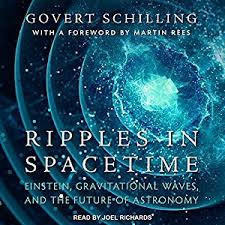I don’t usually review non-fiction books because I’m there to learn, not criticize, unless the book is obviously wrong (I’m looking at you, Hillary). But I must sing the praises of Govert Schilling’s Ripples in Spacetime, which concerns gravitational waves; specifically, the astonishing and world-changing first detection of such a wave on 14 Sep 2015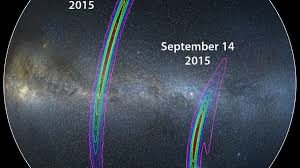
by the Laser Interferometer Gravitational Wave Observatory (LIGO).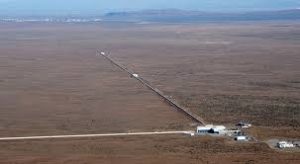 What, you’re not astonished?
What, you’re not astonished?
You should be.
So what’s a gravitational wave and what’s the big deal? Let me take a Great Unwashed stab at it: a gravitational wave is a ripple in reality, a stretching…for lack of a better word…of time and space. Einstein (who else?)
predicted that the extremely powerful forces of star collapse and/or black hole collisions 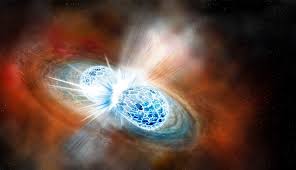
could actually warp time and space, which was nice theory until 14 September and then it was no longer theory. This certainty to which you cling? It ain’t there. Everything regarded as fixed and permanent is not.
Now, yes, I know, I have glossed and short-shrifted much here and even the dullest of physicist is rolling eyes at my Great Unwashedness and tutting over things I have obviously left out or misunderstood and fine, great, condescend much? Point is, I would not have even this lower-than-basic grasp if it wasn’t for this book. At the risk of hyperbole, Schilling is Prometheus bringing fire. At least to me.
Because now, I grasp stars. Didn’t used to.
I wanted to be an astronomer growing up. And a cowboy, and a firefighter, yeah, yeah, pretty much every average kid wants to be all three at one point (imagine how cool a cowboy firefighter astronomer would be). But while I never had a horse or red truck, I did have a dinky little 60x telescope through which I swore I saw the Apollo 11 command module circling the moon that night in July 1969. I was going to work on Mt. Palomar 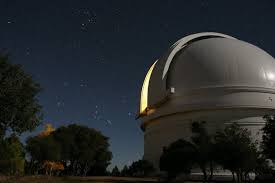 and wear a white lab coat and squint through eyepieces and, one day, see the Eye of God
and wear a white lab coat and squint through eyepieces and, one day, see the Eye of God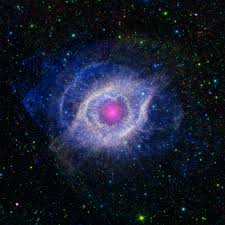 squinting back. So what stopped me?
squinting back. So what stopped me?
Math.
By the time I got to Algebra II, I was a goner. Just. Didn’t. Get. It. And I was a good student, got A’s in everything…except math. C’s, mostly. And because one of the basic requirements for squinting through eyepieces was math beyond Algebra II, I was doomed. And frustrated. Why don’t I get math? My brother, who dropped out of high school, grasped physics and calculus and trig like it was simple addition and subtraction. ‘Course, he has a genius IQ, proof that school bores the uber-smart so much they dispense with it. I do not have a genius IQ. I have one high enough to know what I want, but low enough to prevent its accession. Not for lack of trying. I took a basic astronomy course in college as a backdoor way in but, as soon as we reached star composition, got lost. So I put away that childish thing of being an astronomer because I will never, ever, get this. And then I read this book.
And now grasp stars.
Not enough to rekindle that long dormant astronomer career but enough to understand what I squint at through eyepieces. The endlessness of space, the time traveling, the mind-blowing amounts of energy involved, the speeds…man. Schilling explains it all in very basic language that, at times, sounds a bit patronizing except he seems to know that guys like me are willing to be taught so he stays on this side of snobbery. Which is fine; at this point in my life, I am willing to be taught. His detailed and patient description of how neutron stars form is a grand example. Man. The sheer power involved in the squeezing of atoms to such densities is downright terrifying.
If I have a nit, it’s that Schilling takes a journalist approach to the entire gravitational wave industry and reports on every. Single. Program. Out there. Even ones still on the drawing board and fine, great, I get that, but really, spend more time on what all this means. Is my Monday now going to be longer? Is my drive to the beach shorter? Should I time either or both to coincide with the next supernova? We Unwashed want to know.
Good job, Mr. Schilling. How ‘bout you do the next book on atoms, another concept I never understood and still don’t. You mean, this rock I’m holding in my hand is nothing but billions of little solar systems?
Hmm.
